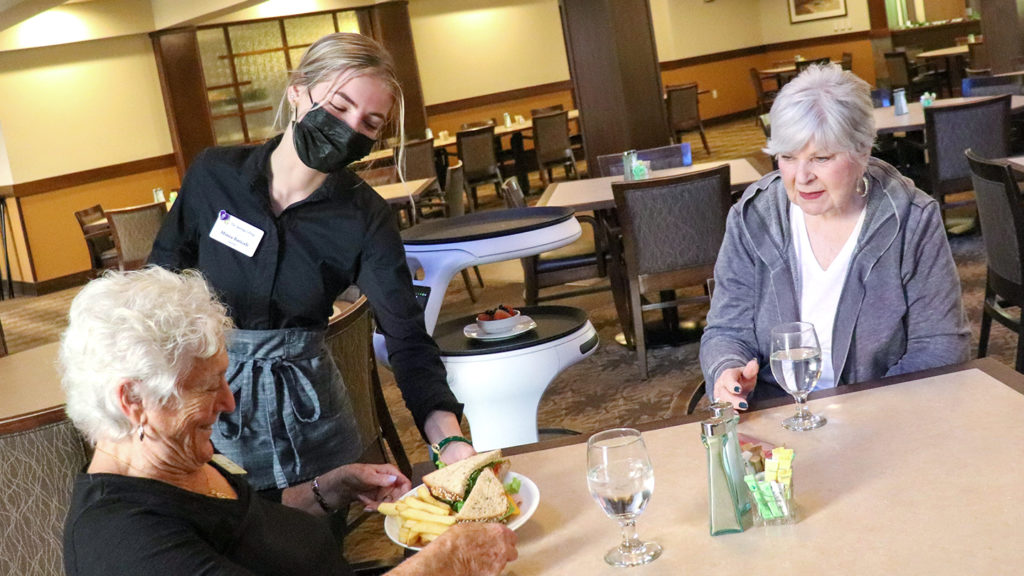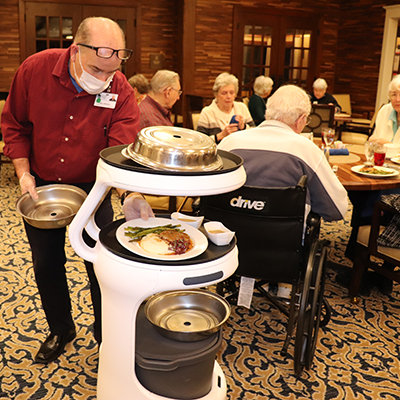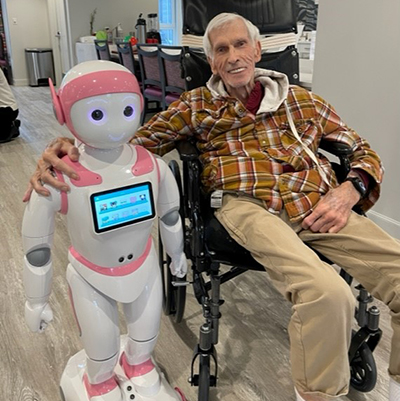
Senior living providers are creatively implementing an array of technology to address challenges related to workforce shortages, improve resident satisfaction, prevent falls, improve health and safety outcomes and encourage socialization.
Robots for dining services
For instance, Servi robots are becoming a common sight in senior living dining rooms across the country.
The robots take on the mundane tasks of delivering meals and running dishes back to the kitchen from the dining room, freeing up dining staff members to engage with residents.
“The great thing about the robots is that they augment our services’ role by doing the tasks that don’t take a warm smile or a caring person to do,” The Springs Living CEO Fee Stubblefield said in a statement. “This frees up staff to focus on their relationships with residents whose feedback has been overwhelmingly positive.”

Produced by Bear Robotics in Silicon Valley, Servi robots have three tiers on which trays can be placed to deliver hot food from the kitchen quickly and to return empty dishes. Each robot can hold up to 66 pounds and has a 12-hour battery life. Illinois-based IT services and consulting firm ServingIntel recently announced a partnership with Bear Robotis to distribute the robots to the dining services sector in senior living communities and restaurants.
The Springs Living launched the robot servers at The Springs at Lake Oswego in August, gradually adding more robots in other communities. Based on positive feedback from dining staff members and residents, the company plans to continue to add more robots in 2022.
Juniper Village at Bucks County is piloting the use of the robots to help the dining services department run more efficiently. Juniper Communities Regional Director of Dining Services Kris Kishbaugh told the Lower Bucks Times that he expects Servi to assist dining operations in several ways, including expediting food delivery, bussing tables, reducing breakage and delivering meals to rooms.
White Horse Village similarly added the robots to its dining services team. Residents of the Newtown Square, PA, nonprofit senior living community named their robot “Robbie.”
“Residents think Robbie is cute, and they like the music it plays while motoring about the restaurant,” said Jim Snively, chair of the white Horse Resident Association’s Dining Advisory Committee. “Robbie carries meals to our table promptly ensuring they are served hot, allowing servers to pay more attention to their assigned tables and relieving them from carrying heavy trays.”
Simpson Senior Services Communities also adopted the Servi robots as part of a partnership announced last fall with Sodexo to implement creative approaches to dining services in its Philadelphia communities.
Along with the robots, Sodexo introduced “Happy or Not” touchscreen kiosks at Simpson Senior Services Communities to provide feedback on each meal, a Bite app to browse upcoming menus and see nutrition information on specific dishes, and a meal tracker to capture food preferences, restrictions and nutritional needs of residents in higher levels of care.
Mobility technologies
Servi joins the other technology programs implemented on the White Horse Village campus, including Zeen mobility devices and K4Connect community systems for home automation, communication, engagement and voice technologies, as well as team and operator tools.
Several White Horse Village residents participated in a Zeen trial, contributing to the final version of the technology making its debut at the community last year. Residents inspired the product concept when Exokinetic CEO Garret Brown, whose mother lives in the community, saw how challenging walkers and wheelchairs were to maneuver.
The mobility device uses lifting technology and casters to help users get around. The Zeen moves to standing, walking and barstool heights, and it lowers to become a chair. The device has become a useful tool for physical therapists as well.
Preventive care
Improving health outcomes for residents is another area where technology is serving senior living communities.
Legacy Senior Communities in Dallas recently announced the implementation of Trueloo smart toilets by Toi Labs in resident homes.
The early detection toilet seat helps identify potential health issues — such as urinary tract infections, dehydration, bleeding, infectious diseases and more — in the privacy of a resident’s home.
“The Trueloo smart toilet provides early detection of oncoming health complications before they become acute, and all in a dignified and valuable manner,” Legacy CEO Melissa Orth said in a statement. “This expedites our care response and can potentially avoid a health complication altogether.”
Legacy began piloting the units in March in memory support at the Kalman and Ida Wolens Foundation Healthcare Center at the Willow Bend life plan community and at the Midtown Park community’s Andrea and Richard Skibell & Leslie Rudd Healthcare Center. The assisted living and memory care communities will continue manual monitoring to establish a control group.
“We decided to trial the smart toilets in two different service areas,” Legacy Senior Director of Strategic Development Bridgette Walshe said. “We want to ensure that this technology is noninvasive and nonintrusive while providing accurate, proactive and relevant data.”
Maple Knoll Communities also is using technology to improve outcomes and reduce falls. The Cincinnati-based continuing care retirement community deployed CarePredict’s technology platform across the almost 400 independent living, assisted living, memory care and skilled nursing residences on its 54-acre campus.
The technology includes smart wearable devices to indicate potential health declines, location insights, staff alerts, communication, keyless door entry and point-of-sale systems.
“As a technology-first group, Maple Knoll believes within the energy of innovation and that expertise can and does make life simpler for residents, workers and households,” Maple Knoll Vice President and Chief Innovation Officer Andy Craig said in a statement. “Our partnership with CarePredict underscores our dedication to carry the most recent in confirmed innovation to our communities, and is part of our evolving digital technique to drive proactive care.”
Heritage Senior Living in Wisconsin also is using technology for falls management. The senior living provider is partnering with Dele Health Tech in an effort to maintain resident dignity and provide falls management using sensor technology.
“We are always looking for innovative technology solutions that enhance care, save time and optimize operations,” Heritage IT Manager Dallas Behling said in a statement, adding that the partnership offers “seamless integrations with our current systems and are technologically flexible.”
Heritage Vice President of Clinical and Quality Services Amanda Runnoe said the technology will allow the senior living provider to be more efficient in its daily operations and caregiving. The technology, she added, offers privacy for residents by using sensor technology as opposed to traditional camera or video monitoring.
“No longer do we have to worry about how long someone was lying on the floor and unable to reach a pull cord or access a pendant,” Runnoe said. “Maintaining resident dignity was also very important to our team and families.”
Data streams from in-apartment smart devices provide real-time alerts, allowing care teams to respond quickly to resident fall incidents and indicate outcomes with one touch.
Socialization

Solera Senior Living, saying it is always looking at innovation and technology to advance the senior living experience, launched Social Bots at its communities across the country to help its residents “live exceptional every day.”
The robots complement Solera’s life enrichment program, offering another way to promote engagement through interesting and unique touches, Senior Vice President of Sales and Marketing Anna Wynn told McKnight’s Senior Living.
Each of the seven communities uses its social bot in a different way, from greeting people and answering questions to entertainment and dance parties, Wynn said, adding that an eighth community is working on getting its own social bot.
“When we say we are hospitality-focused at Solera, we believe it is our core responsibility to push the frontiers of knowledge and then connect these types of advancement to the older population in order to, quite simply, enhance their lives,” Wynn said.
